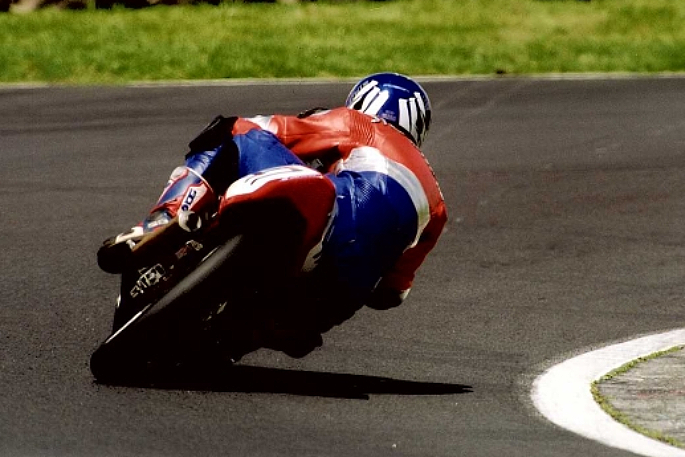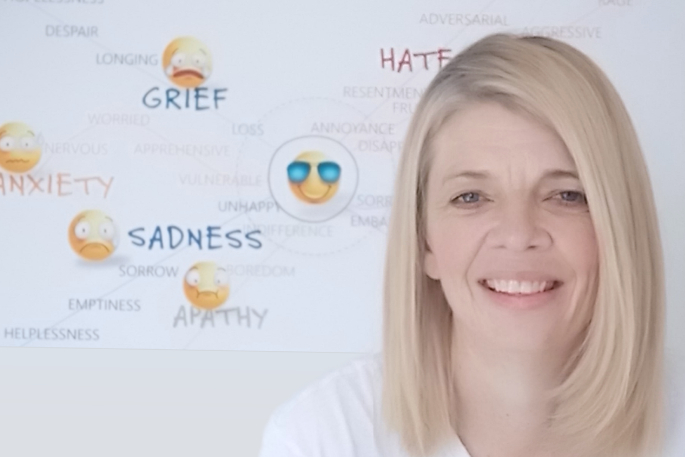A Tauranga-born woman is launching a free online emotions guide.
Sally Steadman, a mental performance coach and motorcycle racer, suffered a traumatic brain injury leaving her with increased emotional sensitivity, giving her the personal experience to create this guide.
In 2002, Sally was the fastest of only a few female racers in NZ at that time and would spend most weekends getting up at 4am to compete somewhere around the country on her 125 Grand Prix bike.
However at the first round of nationals that year, her world would flip on its head when her motorbike had a mechanical failure mid-corner at Pukekohe Raceway, causing her to fly into the air ‘superman-style’ and sustain a fractured skull and TBI.
"Right after my accident I went through a number of post-concussion experiences, and found that while my analytical brain was dampened for a good eight months, I had an increased emotional sensitivity and intuitive capability, which has since come in handy for writing the guide,” says Sally.
“The accident also made me look at my life differently, and from that point onwards, pretty much everything in it changed, including my career, relationships, the country I lived in, and the way I approached life.”
Sally utilises the emotional sensitivity she gained from a traumatic brain injury, and the lived experience that followed, to gain deeper insights into our everyday emotions, and to develop practical tools for managing them.
By taking a more positive and practical approach with the guide, she hopes people will find it easier to understand them better, see the wisdom that sits behind them, and feel more empowered to manage them effectively.
According to ACC, an estimated 35,000 people in New Zealand suffer from TBIs every year.
Of these, 95 per cent are mild, and 20 to 30 per cent are encountered during sports or recreational activities.
Most who experience TBIs go on to lead relatively normal lives after recovery, however, the impact of a TBI is highly variable with each person and situation.
In some instances, especially with moderate or severe TBI, the effects can last for months, years, or even a lifetime.
A year after sustaining her TBI, Sally returned to university to complete a degree in Psychology, gaining theoretical insight into her practical experience, and putting her brain through the paces.
“Looking back, that was one of the best things I could have done.
“I had to sleep during my lunch breaks and about 10 hours every night, so my life was just study and sleep, but the combo of stretching my analytical brain with lots of recovery time in between got everything working well again.”
Two decades on, Sally has drawn upon her TBI experience while writing the guide.
 Sally Steadman, former motorcycle racer. Photo supplied.
Sally Steadman, former motorcycle racer. Photo supplied.
"While I still have challenges as a result of my head injury, I am lucky that it eventually left me able to tune in and use the emotional, intuitive, and analytical parts of my brain at the same time – on a good day anyway!”
“It also made it easier for me to find what works to gain control of the emotional brain circuitry more easily and effectively, which is something we can all benefit from – brain injured or not.”
To write the guide, Sally teamed up with esteemed Neuroscience Educator, Nathan, who spent countless hours reviewing content and providing feedback to make it more relatable.
“My style was way too boring and dry before Nathan came along, and seeing it through his lens opened my creative side up further, which took it to another level again,” says Sally.
Nathan says he saw Sally's work as important and had no hesitation in helping out.
“There is often a gap between experiencing emotion and knowing how to process it,” says Nathan.
“I like how Sally has taken a very right brain, often an intuitive process, and translated it into a very left brain procedural guideline that anyone can follow,” says Nathan.
“It is ultimately the integration of these two approaches that the brain seeks for harmony and well-being, and Sally has provided the map that gets us there!”
Sally says she hoped the guide would help to close the huge gap in the community between getting advice from a friend and seeing a counsellor.
“I know that our mental health professionals are becoming more and more stretched, and their increasing workload has them bordering on, or even running at burnout levels," she says.
"I wanted to make this info available to everyone so we can get better at sorting out the lower complexity stuff ourselves, which with practice, makes it much easier for us to work through the bigger stuff.”
Spending the last five years writing the guide, Sally has realised the positive side of these ‘negative’ emotions.
“There’s quite a bit of wisdom behind them, trying to nudge us towards a better way of life.”
“I hope I can give them a much better rep than they currently have, so we can take a fresher and lighter approach to working with them.”
“Once we know what the emotion is trying to tell us, we can decide if we need to change anything, then clear the residual emotion out, and move on wiser for the experience.”
Sally has also developed an Emotions ‘Map’, to help herself and others visualise what is going on, which she will share in online and nationwide public talks.
“My past career was as an IT analyst, so I am used to conceptualising how everything fits together, and I needed to have a picture in my mind as I wrote the guide.”
“It’s not based on scientific research yet, but hopefully someone will do something with it one day.
“In the meantime it seems to be helpful to convey what is going on, and fits with our common understanding of them, so I think it’s worth sharing.”
“I had a parent come to me after my first talk and say ‘My son has been having difficulties, and with that map, I can now see exactly what I can do to help him’.
“That made my week.”
“And it is really what my goal is – to make it easier for people to understand and help each other, every day.”
To access the free online emotions guide, visit: www.emotions.guide
To learn about Sally’s upcoming talks, visit: www.emotions.guide/events
Connect with her on Facebook here: www.facebook.com/sallyjSally



0 comments
Leave a Comment
You must be logged in to make a comment.